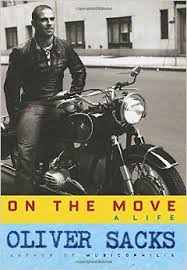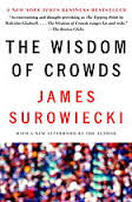Author: Oliver Sacks
ISBN: 978-0-385-25254-3
APA Style Citation
Sacks, O. (2015). On the Move: A Life. New York: Random House.
| on_the_move_activity.pdf |
Oliver Sacks was born in England but has travelled and lived in Canada, California, New York, and Australia. In Sacks’ latest and final book, he reflects on his life, friendships, and patients. Sacks was born the youngest of four brothers to physician parents. After completing medical school, he embarked on a trip to Canada and thus began his life “On the Move”. Sacks is a man of many interests who is well known for books about patients with unique neurological disorders or amazing talents which he wrote about in Awakenings, The Man Who Mistook His Wife for a Hat, An Anthropologist on Mars and many more. On the Move depicts the complex man behind the many stories that have become synonymous with his name.
Sacks had a long time interest in ferns and would visit botanic gardens on a nearly daily basis regardless of his location to sit with his favorite ferns. He loved music and theatre and often spent his evenings enjoying a play or listening to a concert. He played piano and had his parent’s piano shipped from England to New York so he could continue to enjoy it. Sacks became fluent in Hebrew after spending time living in a kibbutz. When he was younger, he spent his weekends on his motorcycle and would often drive from Los Angeles to Las Vegas and back in a single weekend for the solitude riding brought him. Sacks swam nearly everyday in his younger years and until jellyfish surrounded him near his home just outside of New York City, he kept up this ritual. One summer Sacks even rented a room in the basement of an old Inn in upstate New York just so he could enjoy swimming in the nearby ponds and lakes. Sacks would swim for hours and often came up with some of his best writing while out for a swim. He would leave the water to scribble some notes onto a soaking wet pad to be deciphered later. Sacks was an avid hiker and would walk nearly anywhere he could until old age slowed him down. Even after major back surgery he would take the arm of his long-time assistant and amble down to his office to write while standing because sitting was too painful.
Shortly after arriving in the United States, Sacks became a competitive weight lifter and trained on Venice Beach in California. He was quite successful and broke many records in the squatting category. Sacks also loved the elements on the periodic table. One of his friends threw him a birthday party in which all of the guests arrived dressed as elements and Sacks was thrilled at the thoughtfulness of this gesture. He collected elements, which he kept on his desk and delighted in their touch and the differences between each specimen.
Early on, Sacks thought he might be interested in becoming a marine biologist or a zoologist, but during his time at Oxford he became interested in neurophysiology. During this time, he read Maynard Keynes’s Essays in Biography, which he credits with sparking his own desire to write clinical biographies. Later, A.R. Luria’s Mind of a Mnemonist cemented this desire. It was also at this time that he began attending lectures related to psychology and became interested in visual perception, which would remain an interest throughout his life.
Sacks speaks fondly of the many mentors he had throughout his life both professional and personal, from the kindly Dr. Kremer at Middlesex hospital in England to the friends with whom he enjoyed theatre and books. He surrounded himself with those who he found inspirational and his genuine gratefulness for these friends comes though in his writing. Author Thom Gunn became a lifelong friend after they met in the 60s in San Francisco. On the Move is named for one of Thom’s poems of the same name.
On the Move
At worst, one is in motion;
And at best,
Reaching no absolute, in
which to rest,
One is always nearer by not
keeping still.
Sacks saved many of the letters he exchanged throughout his life and includes many quotes in the book, from his aunt’s encouraging letters about travel and self-discovery to physicians inquires about his case studies. Sacks also shares his perspective regarding his brother’s decent into schizophrenia and the toll it took on the family as he moved between psychotic states and periods of relative calm.
Sacks shares his concerns and self-consciousness to the response of his books both in the popular media and from those in the medical field. While Sacks recalls himself as a “failed” surgeon and lab researcher, the passion he has for the patients he encountered over a lifetime of trying to bring their stories to light is clear. His “failure” may well have been the happiest mistake for those who were able to read and learn from the narratives he provided to help understand the humanity behind the clinical diagnoses.
Other Related Resources
PBS obituary for Oliver Sacks
http://www.pbs.org/newshour/rundown/oliver-sacks-neurologist-acclaimed-author-dies-82/
New York Times, article about Oliver Sacks on the day he passed away
http://www.nytimes.com/2015/08/31/science/oliver-sacks-dies-at-82-neurologist-and-author-explored-the-brains-quirks.html?smid=fb-share&_r=0
New York Times: Opinions July, 2015
http://www.nytimes.com/2015/07/26/opinion/my-periodic-table.html?smid=fb-share&_r=0
New York Times: Oliver Sacks Learning he had Terminal Cancer, February 2015
http://www.nytimes.com/2015/02/19/opinion/oliver-sacks-on-learning-he-has-terminal-cancer.html?gwh=305D116A960AAC56758646057B2890E8&gwt=pay&assetType=opinion
Desktop Fridays: A tour of Oliver Sacks desk
http://www.sciencefriday.com/video/12/02/2010/desktop-diaries-oliver-sacks.html
Resources Related to Specific Oliver Sacks Case Studies
Clive Wearing
Radio Lab episode about Clive Wearing’s story:
http://www.radiolab.org/story/91578-clive/
Life without memory video about Clive Wearing from the Mind series
https://www.youtube.com/watch?v=c62C_yTUyVg
Stephen Wiltshire –Human Camera
Stephen’s Wiltshire’s official website which includes biographical information, photos of his artwork, videos, and even a store where you can purchase prints.
http://www.stephenwiltshire.co.uk/index.aspx
Video demonstration of Stephen Wiltshire’s talents from the BBC documentary Fragments of Genius: Understanding Savants
https://www.youtube.com/watch?v=a8YXZTlwTAU
Video of Stephen Wiltshire
https://www.youtube.com/watch?v=hxVFd51NvWg
Temple Grandin
Temple Grandin’s official website
http://www.templegrandin.com/
Temple Grandin’s TED talk: The World Needs All Kinds of Minds
https://www.ted.com/talks/temple_grandin_the_world_needs_all_kinds_of_minds?language=en
Psychological Figures and Concepts
Jerome Bruner
Noam Chomsky
David Hubel
Lev Vygotsky
Torsten Wiesel
Alzheimer’s disease
Autism Spectrum Disorder
Catatonia
Clozapine
Color blindness
Encephalitis
Huntington’s disease
L-dopa
Language acquisition device
Migraines
Myelinated nerve fibers
Natural Selection
Parkinson’s disease
Peripheral nerve fibers
Proprioception
Propagnosia
Psychedelic drugs
Right/Left hemisphere functions
Schizophrenia
Thorazine
Tourette’s syndrome
Visual agnosia
Visual Illusions


 RSS Feed
RSS Feed